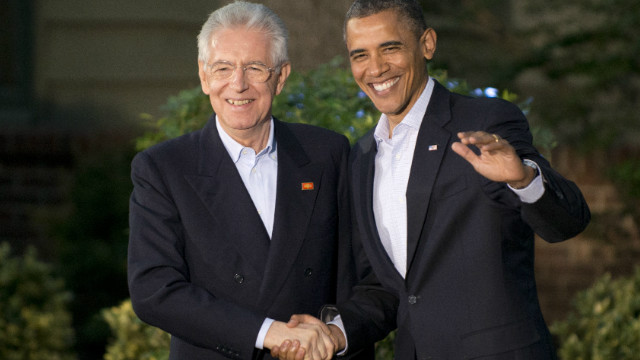
- NEW: Afghanistan is expected to dominate the NATO summit in Chicago
- The Group of Eight leaders are taking up discussions about the eurozone crisis
- Hanging over the discussions are concerns that Greece may exit the eurozone
- The leaders agree North Korea faces further isolation if it pursues a nuclear program
Washington (CNN) -- Concerns about whether debt-laden Greece will be forced to pull out of the eurozone, and what that would mean for a weakened European economy is the first topic on Saturday's agenda at the Group of Eight summit hosted by U.S. President Barack Obama, a senior administration official said.
The discussions come during high-stakes, back-to-back summits where a host of pressing economic and military security issues will be discussed by world leaders during a three-day diplomatic marathon that began Friday with the G8 summit outside Washington and concludes Sunday at a NATO summit in Chicago.
Leaders of the G8 -- made up of the United States, France, the United Kingdom, Germany, Japan, Italy, Canada and Russia -- began the summit at the Camp David presidential retreat in Maryland on Friday with a roundtable dinner where the discussion touching on security challenges in Iran, Syria, North Korea and Burma, according to the official, who spoke on condition of anonymity.
There was wide agreement among the leaders that North Korea faces further isolation if it continues its pursuit of a nuclear program, and they widely agreed that its Iran's responsibility to prove its nuclear program is being developed for peaceful purposes rather than the development of weapons, said the official, who spoke on condition of anonymity as a matter of practice.
But the G8 leaders, who have been divided over how to respond to the conflict in Syria, agreed that a peace plan brokered by U.N. special envoy Kofi Annan was not being honored, the official said. Russian and China vetoed a U.N. Security Council condemning the violence and calling on President Bashar al-Assad to step down.
The leaders, including Russian Prime Minister Dmitry Medvedev, agreed it was time to focus on Syrian President Bashar al-Assad.
Russian President Vladimir Putin will not attend the G8 meeting, which makes significant progress on either Syria or Iran unlikely. Russia has been at odds with the United States and other G8 countries over exactly how hard to crack down on Damascus and Tehran.
Debate Saturday is also expected to focus on whether an economically weakened, debt-laden Europe should continue down the road of massive deficit cuts trumpeted by German Chancellor Angela Merkel or focus more on economic stimulus to help the continent grow its way out of the current crisis.
Hanging over the deliberations is the fate of economically battered Greece, which has been unable to form an elected government. Many analysts believe that Athens will be forced to exit the eurozone shortly, dropping the euro currency and possibly further rattling economic confidence.
The fate of Greece was also front and center during a meeting Friday ahead of the start of the G8 between Obama and newly elected French President Francois Hollande, who was elected on a platform opposing increasingly unpopular eurozone spending cuts.
Obama said he and Hollande agreed the issue was of "extraordinary importance" to the world economy.
"Greece must stay in the eurozone," Hollande insisted during his meeting with Obama. We all "must do what we can to that effect."
Later this weekend, the war in Afghanistan is expected to dominate discussions at the NATO summit. Afghan President Hamid Karzai and Pakistani President Asif Zardari are both expected to attend the meeting.
NATO leaders are currently on a timetable to withdraw all of the alliance's combat troops from Afghanistan in 2014.
One of the key issues to be discussed in Chicago is who will pay to build up Afghan security forces during and after the NATO drawdown. Afghan national security forces should total around 350,000 by 2015, according to CNN National Security Analyst Peter Bergen. Karzai's government can afford to cover only a fraction of the cost, which is expected to total roughly $4 billion annually after 2014, Bergen notes.
Another issue is Islamabad's continued blockade of much-needed NATO supplies over Pakistani roads to Afghanistan. Pakistan has kept its airspace open but closed its ground routes after the death of about two dozen Pakistani soldiers in November at the hands of NATO forces at a post on the Afghan-Pakistan border. NATO insists that the incident was an accident.
Obama officials are also pushing for more Pakistani involvement in peace talks with the Taliban.
Protests are expected near the sites of both the G8 and NATO summits this weekend.
"We expect the worst and hope for the best," said Ross Rice, an official with the Chicago FBI. That "is the way to characterize how the weekend plays out."
CNN's Peter Bergen, Elise Labott and Ted Rowlands contributed to this report.


